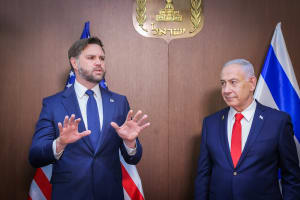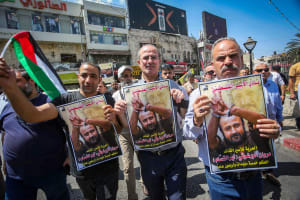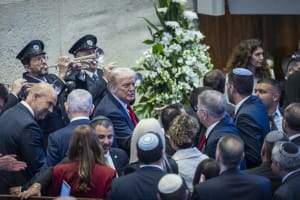How US President Trump kickstarted the latest push to end PM Netanyahu's corruption trial
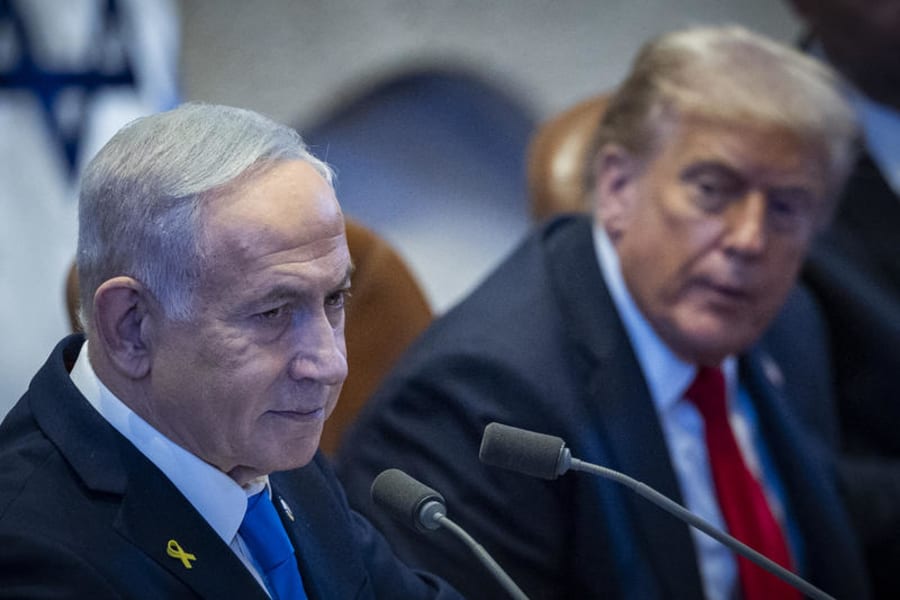
“Give him a pardon, come on.”
U.S. President Donald Trump once again surprised everyone in his speech to the Knesset on Oct. 13, when he went off script, turning to Israel’s President Isaac Herzog with a grin to ask him for a favor for Prime Minister Benjamin Netanyahu, calling him “one of the greatest” wartime leaders.
To the ecstatic applause of Netanyahu’s coalition, Trump added, “Cigars and Champagne, who the hell cares about that? Alright, enough controversy for the day – I don’t think it’s that controversial.”
These comments, ostensibly made off the cuff like so many of Trump’s statements, kicked off a new push by Netanyahu’s allies to achieve a presidential pardon for the prime minister in his corruption and bribery trial, which has now dragged on for over five years.
It is not known whether, like some reports have alleged, Trump’s comments were coordinated with Netanyahu beforehand, or truly spontaneous.
Speaking to reporters on Air Force One later, the president said, “I told him I didn’t want to bring up the pardon, but it was just a perfect spot… He was getting a very good hand and when they stopped, I said, ‘why don’t you give this guy a pardon?’ If he didn’t get a good hand, I wouldn’t have done that.”
In the past, Trump had already demanded Netanyahu’s trial be canceled several times, mocking the charges and comparing them to his own court trials, which, like Netanyahu, he argues are political harassment of a democratically elected right-wing leader by left-wing elites.
Meanwhile, Netanyahu has refrained from commenting on this issue and avoided all appearance of direct contact with the proceedings, as he cannot be seen to try to exert his influence as prime minister over a trial that is continuing against him.
Netanyahu’s new campaign
Whether spontaneous or planned, the request was followed by what appeared to be a concerted campaign from the prime minister’s camp, meant to exploit the attention Trump brought to the issue of a pardon.
Under Israeli law, the president can issue a pardon to those convicted in court, or even before legal proceedings have been concluded, if it is deemed to be for the public good.
However, the request must come from the defendant or his family and include at least a partial admission of guilt. Herzog has indicated he won’t consider pardoning Netanyahu without a formal request.
To date, no such request has been made from Netanyahu’s side, and reports suggest that he would want to avoid the potentially disastrous political consequences of such an admission.
Netanyahu has always maintained his complete innocence in all charges, some of which have begun to disintegrate in the course of the trial.
The day after Trump’s speech, several Likud members showed up at Netanyahu’s testimony in a coordinated show of support, and, in interviews, demanded to end the trial.
Later that day, Justice Minister Yariv Levin announced he would support a proposed law to enable the defense minister to limit the number of hearings in the trial out of concern for national security.
“This morning, instead of continuing the difficult struggle to [secure the] return of all the slain hostages, to disarm Hamas, and to expand the circle of peace, Prime Minister Benjamin Netanyahu was forced to appear in court and answer bizarre questions about dolls and cigars,” said Levin.
Several days later, the coalition announced its plans that the first law to be advanced this Knesset session would be a bill allowing the government to appoint a new independent prosecutor, separate from Attorney General Gali Baharav-Miara, who is supporting the trial against Netanyahu.
The idea is that a new prosecutor general, who would be distinct from, and subject to, the attorney general, would take over the responsibility for the trial and might be open to “reconsidering” the indictments.
This week, the cabinet ministers from Netanyahu’s Likud Party sent a letter to President Herzog, urging him to end the trial, without explicitly mentioning a “pardon.”
The letter claims that the ongoing trial is deepening societal divisions, telling Herzog, “The key to initiating a process of healing and unity lies with you.”
“Unfortunately, it is now clear to all that as long as his trial continues — a festering wound in the body of Israeli society — there will be no unity in Israel. Without diving into further controversy, the least that can be said is that now, years after the investigations and trial began, the situation has soured. It inflames divisions and has long since lost its importance.”
According to Kan News, this move was coordinated with associates of Prime Minister Netanyahu. The report did not detail the extent of the involvement.
The report again noted that the ministers’ letter doesn’t request a pardon but instead argues that the trial should be halted as it is deepening societal rifts; however, it is unclear whether the law allows the president to cancel an ongoing trial for this reason.
President Herzog’s role
Canceling the trial through legislation is also very unlikely to succeed, since the Supreme Court would almost certainly strike it down. Instead, such a move would further incense supporters of the government and the opposition.
This is likely why the Likud and Netanyahu’s camp have marked the route through President Herzog as being more promising of success.
Herzog, who was the leader of the Labor Party but is seen as a moderate centrist at heart, has also repeatedly called to lower the flames and warned against the societal rift in the country.
The newspaper Haaretz reported in March that Herzog twice approached Attorney General Baharav-Miara to pressure her to agree to a mediation process that would end the criminal proceedings against Netanyahu.
The president reportedly also met with several key figures in the judicial system, as well as those close to Netanyahu, to explore the possibility of a settlement through mediation or a pardon.
In May 2025, he publicly called on both sides to consider a plea deal, arguing that the trial and discussion around it have ballooned out of proportion and are impacting society negatively.
This week, Haaretz reported that shortly before the latest hostage deal was finalized, Herzog also discussed the idea of a pardon with members of hostage families, asking them to promote the idea and grant it public support.
Herzog’s office confirmed that the president had discussed the possibility of a pardon with some families but denied the “lie” that he brought it up; rather, the topic was brought up by Hagai Angrest, the father of recently freed hostage Matan.
The presidential office pointed to comments by Angrest, who said that Netanyahu should be granted a pardon in exchange for the hostages’ release, following the allegations that Netanyahu was dragging out the approval of a deal out of a desire for political gain.
“Maybe if we free the prime minister from his trial, he’ll free our country from this burden. He’s dragging the entire nation down straight to hell,” Angrest said.
In the face of their suffering over the past two years, the hostage families have become effectively unassailable in Israeli public discourse, which would make their support for a pardon a significant stamp of approval from the left side of the political spectrum.
With new elections looming, the prime minister and his allies are sure to continue exploring every possible avenue to resolve the issue of Netanyahu’s corruption trial as quickly as possible.
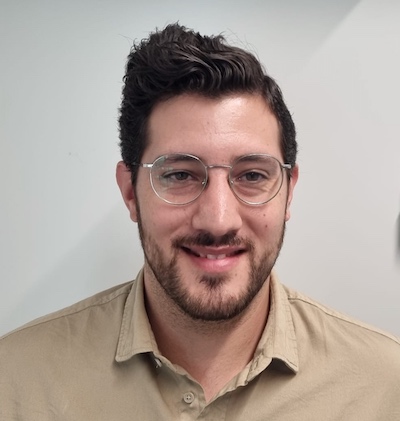
Hanan Lischinsky has a Master’s degree in Middle East & Israel studies from Heidelberg University in Germany, where he spent part of his childhood and youth. He finished High School in Jerusalem and served in the IDF’s Intelligence Corps. Hanan and his wife live near Jerusalem, and he joined ALL ISRAEL NEWS in August 2023.
You might also like to read this:







